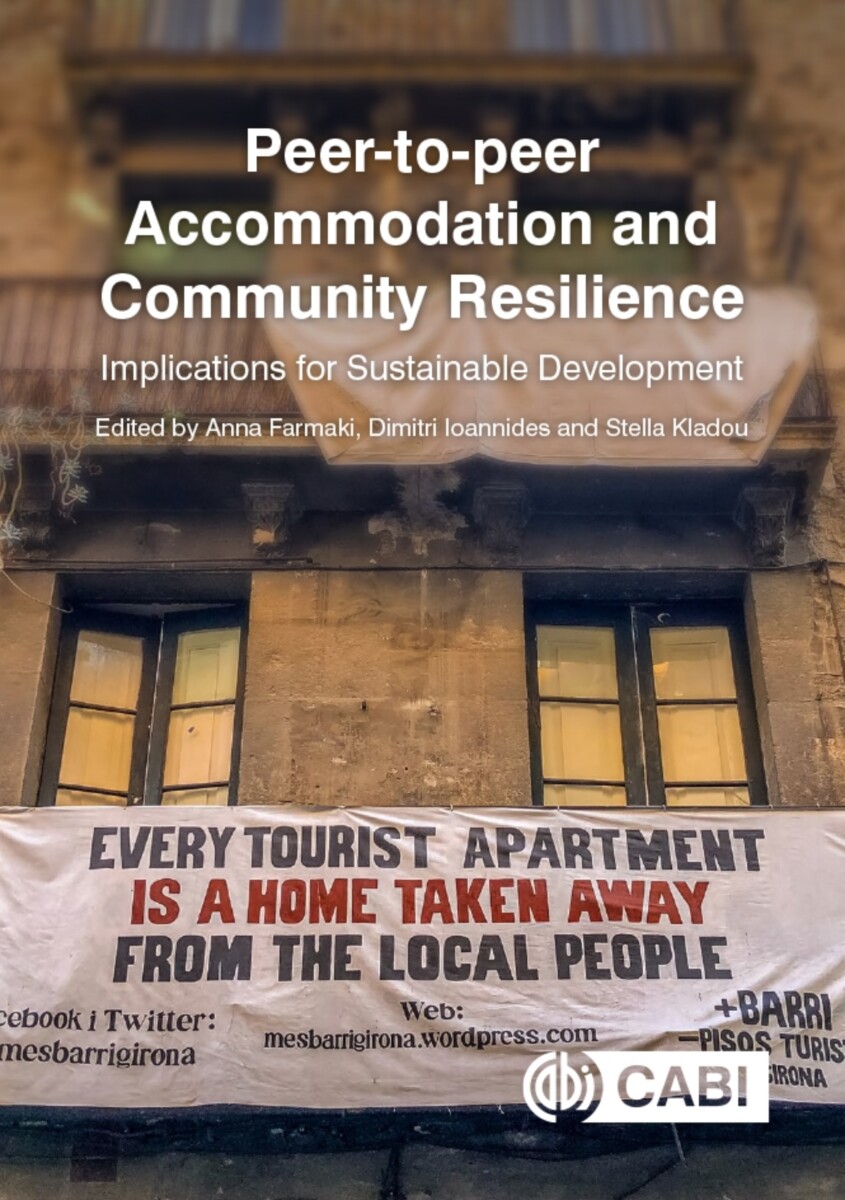Peer-to-peer Accommodation and Community Resilience
Implications for Sustainable Development
- Publisher
CABI - Published
14th March 2022 - ISBN 9781789246605
- Language English
- Pages 192 pp.
- Size 6" x 9"
The growth of peer-to-peer (P2P) accommodation has been remarkable. However, the rapid expansion of the phenomenon has yielded several concerns over its potentially negative economic, social, and environmental impacts.
These impacts are highlighted in policy agendas as an emerging problem encountered by many local communities in destinations experiencing a boom in P2P accommodation. Specifically, concerns have been raised over the impact of the growth of P2P accommodation on local housing markets, residents' well-being and the environment as a result of the touristification of residential areas. In fact, many observers accuse P2P accommodation of fuelling the "overtourism" problem that several destinations face.
This edited book addresses the need to examine the P2P accommodation phenomenon from a community resilience lens. In particular, through a collection of chapters presenting a range of empirical and conceptual perspectives from urban and rural communities, the book considers the implications of P2P accommodation growth on the resilience of local communities and the sustainable development of places.
This book highlights:
- The rapid growth of P2P accommodation yields economic, social and environmental negative impacts on destinations.
- The P2P accommodation sector is evolving towards professionalization which, in turns, creates further implications for local community resilience.
- This book draws attention towards the need to examine the nexus between P2P accommodation, sustainability and local community resilience.
- The collection of chapters presents empirical and conceptual perspectives from urban and rural communities.
- Chapters impart significant insights to policymakers, practitioners and academics in light of the COVID-19 pandemic.
1: Mobile Gentrifiers and Leavers: Tourist Dwelling as an Agent of Exclusion in Barcelona
2: Social Exchanges and P2P accommodation: Residents’ Perceptions in a Neighbourhood Context
3: Airbnb Host Responsibilities and Community Resilience: The case of Japan
4: Peer-to-peer accommodation and resilient hosts in Split: The case of Radunica Street
5: Perceived impacts of STRs in the local community in the United Kingdom
6: Airbnb guests’ pro-environmental behaviour and community resilience: Mitigating the negative impacts of Airbnb tourism
7: Reframing rurality: the impact of Airbnb on second home communities in Wales and Sweden
8: Local Commitment and Withdrawal in Wake of Conspicuous Airbnb-Place Dynamics on a Cold-Water Island
9: P2P Accommodation as a Peacebuilding Tool: Community Resilience and Group Membership
10: “Not in my stairway”: How do neighbours cope with P2P rentals in housing cooperatives?
11: Understanding the Airbnb community and its community impact. The use of scenarios to build resilience
Anna Farmaki, PhD
Anna Farmaki is Assistant Professor in Tourism Management at the Cyprus University of Technology, Cyprus. She holds a doctorate (PhD) in marketing. She has worked for several years in private institutions of tertiary education in Cyprus and was course leader of the undergraduate hospitality and tourism management program at the University of Central Lancashire (Cyprus). She has published extensively in reputable, peer-reviewed academic journals and has presented her work in various international conferences, seminars and workshops. Anna is a Fellow of the Higher Education Academy (UK) and a member of the Management Committee in several COST Actions. She has also been involved and/or led several nationally and internationally funded research projects. In addition, she is a member of the Editorial Board of the International Journal of Contemporary Hospitality Management, Tourism Management Perspectives, Tourism Review and the Journal of Service Theory and Practice. Her research interests lie primarily in the areas of tourism planning and development with emphasis on sustainable tourism, and tourist behavior.
Dimitri Ioannides, PhD
Dimitri Ioannides is Chaired Professor of Human Geography in the Institution of Economics, Geography, Law and Tourism and a researcher in the European Tourism Research Institute at Mid-Sweden University. Previously, he taught at Missouri State University and held a part-time position at the Centre for Regional and Tourism Research in Bornholm, Denmark. He has published extensively in various journals including Annals of Tourism Research, Tourism Management and the Journal of Sustainable Tourism on issues such as the economic geography of tourism and sustainable development. He is especially interested in matters relating to the social-equity dimension of sustainability, including the geographies of tourism workers and work. He has co-authored books relating to tourism issues, including the Economic Geography of the Tourist Industry (Routledge). Currently, he is an editor of Tourism Geographies (in charge of special projects) and serves on the editorial board of several other journals. He also edits the New Directions in Tourism Analysis series (Routledge) as well as serving on the board of the International Polar Tourism Research Network. He is a past recipient of the Roy Wolfe Award for Outstanding Contributions to the Recreation, Tourism and Sport specialty group of the Association of American Geographers.
Stella Kladou, PhD
Stella Kladou is a Postdoc researcher at the Hellenic Mediterranean University in Crete, Greece. She has served as an Assistant Professor in the Tourism Administration Department at Bogaziçi University in Istanbul, Turkey and a Senior Lecturer at Sheffield Hallam University in the UK. Her PhD in ‘Evaluating Cultural City Brands: The case of Athens, Istanbul and Rome’, was realized in cooperation with the Hellenic Open University in Greece, Istanbul Bilgi University in Turkey and the University of Rome La Sapienza in Italy, and partially funded by the Italian Ministry of Foreign Affairs and the Scientific and Technological Research Council of Turkey. She has published in prominent academic journals and books of international publishers, and presented at well-esteemed international conferences. She has participated and/or led several international and national projects as a researcher or consultant. She is an International Place Brand Specialist for the Place Brand Observer, and in the scientific and editorial board of international conferences and the Journal of Qualitative Research in Tourism respectively. Her research mainly pertains to place branding, cultural and wine tourism, and digital marketing.


